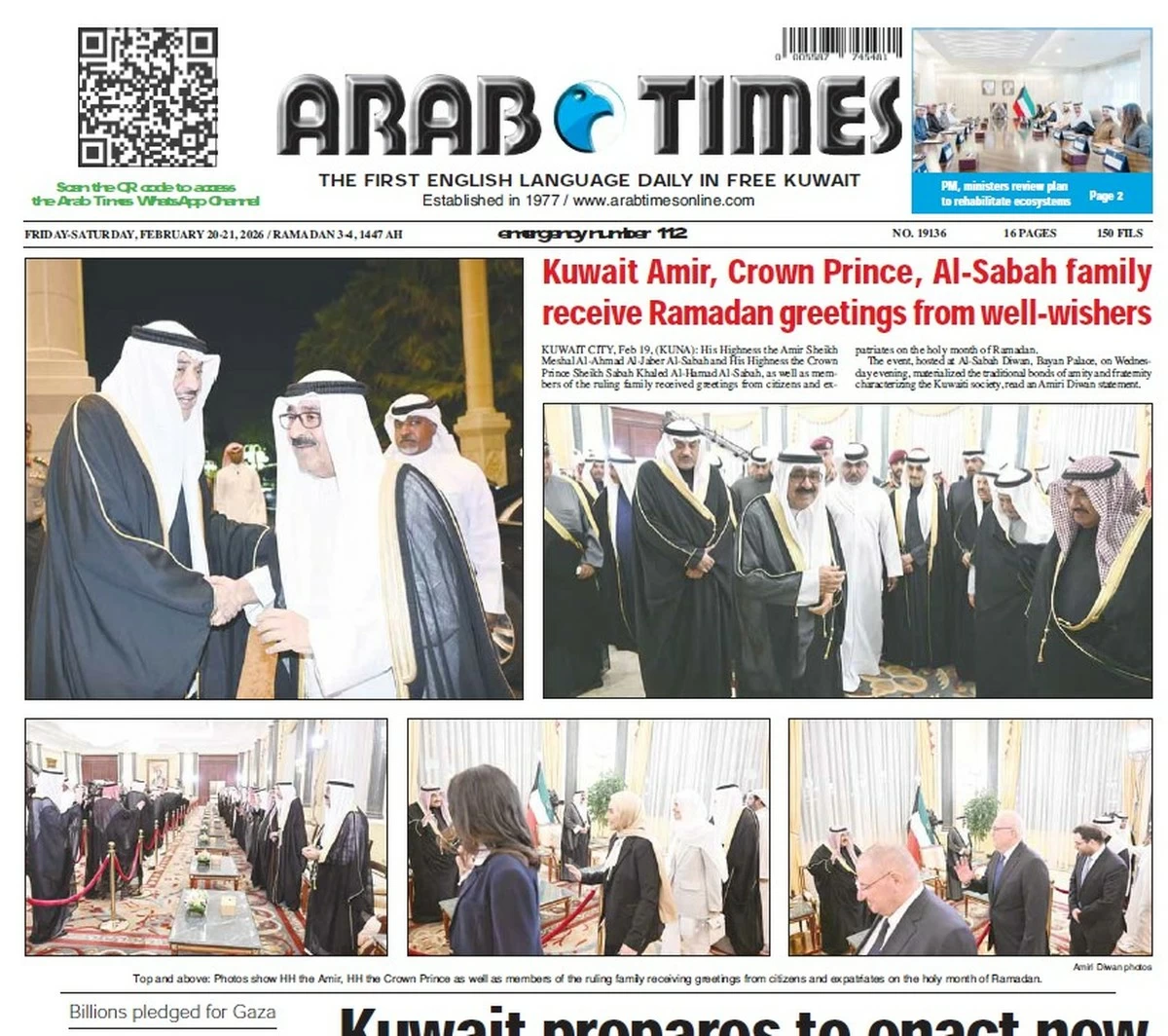02/02/2025
02/02/2025
A SENIOR official is like a physician who must always be on standby. Some Gulf countries adopt this principle, as they are racing against time to achieve the highest levels of progress and prosperity for their people. In these countries, every employee, from top to bottom, works hard on development, driven by the belief that opportunity is like a bird that a skilled hunter should never miss. As a result, institutions in these countries often operate on a two-shift or even a three-shift system, ensuring work continues 24/7 when necessary.
This approach has enabled these countries to surpass us in development and achieve excellent results in many sectors, particularly in the economic sector, which is the backbone of a successful state. Officials in these countries, including ministers, undersecretaries, and directors, are constantly working, even on holidays. Their office doors are always open to meet with people. A notable example is the visit by the Vice President of the UAE and Ruler of Dubai Sheikh Mohammed bin Rashid to one of the ministries. When he found the officials’ doors closed, he immediately ordered a carpenter to remove all the doors.
He reasoned that officials should focus on serving the people, and listening to their complaints and opinions, instead of enjoying the privileges of their positions. That same year, the UAE ranked 17th in the world on the Happiness Index. What about Kuwait? Since 1992, Kuwait has faced the dilemma of conflict of interest among members of the National Assembly, ministers, and some influential figures. This has harmed society and development, leading to a decline in various public service indicators. A clear example of this is the miserable condition of the country’s roads. Many public institutions and ministries have been turned into personal farms for the benefit of certain ministers or MPs.
This approach has enabled these countries to surpass us in development and achieve excellent results in many sectors, particularly in the economic sector, which is the backbone of a successful state. Officials in these countries, including ministers, undersecretaries, and directors, are constantly working, even on holidays. Their office doors are always open to meet with people. A notable example is the visit by the Vice President of the UAE and Ruler of Dubai Sheikh Mohammed bin Rashid to one of the ministries. When he found the officials’ doors closed, he immediately ordered a carpenter to remove all the doors.
He reasoned that officials should focus on serving the people, and listening to their complaints and opinions, instead of enjoying the privileges of their positions. That same year, the UAE ranked 17th in the world on the Happiness Index. What about Kuwait? Since 1992, Kuwait has faced the dilemma of conflict of interest among members of the National Assembly, ministers, and some influential figures. This has harmed society and development, leading to a decline in various public service indicators. A clear example of this is the miserable condition of the country’s roads. Many public institutions and ministries have been turned into personal farms for the benefit of certain ministers or MPs.
After the Iraqi invasion, Kuwait needed officials who were dedicated to working for the nation, not for their gain or the benefit of their friends. The focus should have been on abandoning the policy of favoritism. Officials were expected to hire only competent individuals who should have been ready at all times to work, make sound decisions, and prioritize the nation’s needs over any personal interests.
This unfortunately did not happen. Instead, we became entangled in the dangerous web of satisfying personal interests, a game that has come at a high cost for the people, one that they continue to pay for. What transpired over the past three decades was the complete opposite of everything Kuwaitis had hoped for. The citizens longed for a glimmer of hope to build their future upon, but they instead witnessed huge conflicts over trivial matters. Senior officials and MPs competed to undermine the country’s supreme interests to preserve their benefits.
Corruption reached such heights that it is now impossible to deal with it without a painful surgical operation. Today, the leadership of the new era has made it clear what is required of everyone: Kuwait must regain its leading position. With ministerial and assistant positions now stabilized, there is no excuse for officials not to work hard around the clock. Active morning and evening shifts should be implemented, and afternoon shifts must be productive, not exploited for personal gain. Certain departments must work all day. The devastation and decline in all sectors require the entire country be transformed into a large 24/7 workshop that is focused on recovery and progress.
Similarly, all officials responsible for amending laws must work full-time. Wasting time is an unforgivable mistake, as time shows no mercy. Kuwait has been lagging for years, and citizens have grown tired of empty slogans and unimplemented ministerial programs. It is now time for serious work programs to become a reality. While we have heard many ministers and officials repeat the usual slogan that their doors are open, this has yet to be reflected in action. Given that citizens are placing their hopes in the new era, officials must rise to the responsibility entrusted to them and be fair enough to make the right decisions, even if it means going against their interests.
This unfortunately did not happen. Instead, we became entangled in the dangerous web of satisfying personal interests, a game that has come at a high cost for the people, one that they continue to pay for. What transpired over the past three decades was the complete opposite of everything Kuwaitis had hoped for. The citizens longed for a glimmer of hope to build their future upon, but they instead witnessed huge conflicts over trivial matters. Senior officials and MPs competed to undermine the country’s supreme interests to preserve their benefits.
Corruption reached such heights that it is now impossible to deal with it without a painful surgical operation. Today, the leadership of the new era has made it clear what is required of everyone: Kuwait must regain its leading position. With ministerial and assistant positions now stabilized, there is no excuse for officials not to work hard around the clock. Active morning and evening shifts should be implemented, and afternoon shifts must be productive, not exploited for personal gain. Certain departments must work all day. The devastation and decline in all sectors require the entire country be transformed into a large 24/7 workshop that is focused on recovery and progress.
Similarly, all officials responsible for amending laws must work full-time. Wasting time is an unforgivable mistake, as time shows no mercy. Kuwait has been lagging for years, and citizens have grown tired of empty slogans and unimplemented ministerial programs. It is now time for serious work programs to become a reality. While we have heard many ministers and officials repeat the usual slogan that their doors are open, this has yet to be reflected in action. Given that citizens are placing their hopes in the new era, officials must rise to the responsibility entrusted to them and be fair enough to make the right decisions, even if it means going against their interests.
Ahmed Al-Jarallah
Editor-in-Chief, the Arab Times



